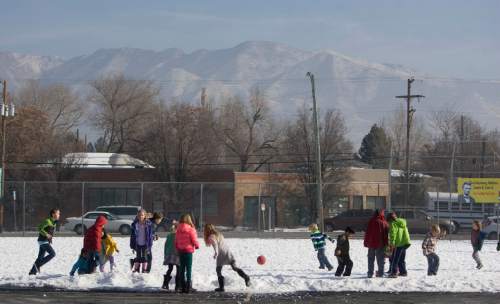This is an archived article that was published on sltrib.com in 2016, and information in the article may be outdated. It is provided only for personal research purposes and may not be reprinted.
If a Utah state senator walks onto the floor waving a piece of paper that, he says, would boost economic development, he's likely to have a dozen co-sponsors before he sits down. If a member of the House tells a committee that his idea is good for families, chances are the bill will be approved without dissent or even much debate.
And in Salt Lake City, in winter, when air quality is measurably among the worst in the nation, one might think that any bill that is reasonably likely to make a difference on that score would fly through the process.
Yet, with the 2016 session half gone, little to no progress has been made toward passing laws or appropriating funds that are aimed at cleaning up our air, our lungs, our blood vessels and our children's future.
Do these guys ever look out a window?
The annual legislative session generally coincides with the worst of the Wasatch Front's atmospheric inversions, trapping all kinds of gas and particles in the low-lying atmosphere. So measures aimed at cutting down on air pollution ought to have a head start.
But lawmakers are being oddly frugal with funds for monitoring equipment in the more populous counties in the Salt Lake metro area and around St. George.
The suspicion that air monitoring isn't winning support because legislators don't want to know how bad it is is supported by their other actions. Or inactions.
Measures that would update the version of the Uniform Building Code enforced in the state are being held up and watered down. The latest generation of water heaters, for example, produces much less nitrogen oxide, a pollutant that is among those doing the most damage to Utah lungs. But measures to require that no other kind be sold in these parts has been weakened to include only new construction or contracted remodels, leaving out normal replacements.
Laws and rules to more frequently update building code standards, or empower the Department of Environmental Quality to put them into place on its own, have stalled.
This matters because, as cars get cleaner, emissions from buildings will become an ever-larger source of pollution, and a sweeter target for real improvement in our air quality. And because more efficient household equipment will not only pollute less, but save homeowners money over time.
The Legislature's reluctance to act on these — or any — proposals that have a credible hope of cleaning up our air suggests that its members are more in thrall to builders and developers, who want to cut costs up front, and not really concerned about the long-term damage to everyone's health.
Disgraceful.



